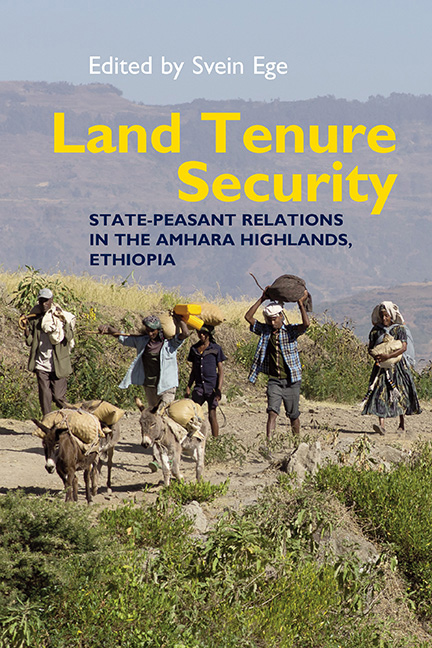Book contents
- Frontmatter
- Dedication
- Contents
- List of Illustrations
- Note on Transliteration
- Dates and Measures
- Contributors
- Preface
- Glossary
- Map
- 1 Introduction
- 2 Peasant Land Tenure: A Critical Review
- 3 The Dersha System: Rethinking Land Tenure under the Därg
- 4 Land Tenure in Gojam under the Därg
- 5 Land Tenure in Baba Säat, North Wälo
- 6 Rich and Poor: Land and Wealth in Mäqét, North Wälo
- 7 Rural Land and Urban Aspirations: Future Orientation in a Time of Change
- 8 An Unstable Land Tenure System
- 9 Conclusion
- Postface
- Select Bibliography
- Index
- Eastern African Studies
1 - Introduction
Published online by Cambridge University Press: 26 March 2019
- Frontmatter
- Dedication
- Contents
- List of Illustrations
- Note on Transliteration
- Dates and Measures
- Contributors
- Preface
- Glossary
- Map
- 1 Introduction
- 2 Peasant Land Tenure: A Critical Review
- 3 The Dersha System: Rethinking Land Tenure under the Därg
- 4 Land Tenure in Gojam under the Därg
- 5 Land Tenure in Baba Säat, North Wälo
- 6 Rich and Poor: Land and Wealth in Mäqét, North Wälo
- 7 Rural Land and Urban Aspirations: Future Orientation in a Time of Change
- 8 An Unstable Land Tenure System
- 9 Conclusion
- Postface
- Select Bibliography
- Index
- Eastern African Studies
Summary
THE AFRICAN CONTEXT
Africa is still predominantly rural, and Ethiopia is overwhelmingly so. Africans are, more than anything else, smallholders. Despite a rapid process of urbanization across the continent, the total number of smallholders continues to increase due to population growth (Gollin 2014: 6). To be a smallholder in Africa is to be poor, to live at the mercy of forces beyond the farm, to be tossed around by climate, the exactions of the state and conflicts of various kinds, in addition to the constant worries about how to feed the family. Currently, famine strikes occasionally in several parts of Africa, and the choice of many Africans to migrate to other continents, although they know the risks, speaks volumes to the despair they feel.
Smallholder farming usually refers to farms of less than 5 hectares, operated by family labour and producing crops mainly for their own consumption (FAO 2017). In the areas covered in this book, few farms are above 2 hectares, and the average is about half of this. For these peasants, land is of vital importance. One would think that, in view of its significance to the people concerned, there would be a rich and varied literature on the topic, but this is hardly the case. In his introduction to one of the more significant works, Bassett (1993: 3) observed that peasant land tenure was not much discussed in the research literature. Similarly, in his grand review of land tenure and land reform practices in Africa, Bruce (1989: 25) noted that for most countries we simply lack information on peasant land tenure. Even for well-studied topics, such as the Tanzanian ujamaa villages, the degree of tenure security for individual farming households (ibid.: 21) has been neglected in the research.
By far the most common land tenure regime in Africa is state land ownership, by which I mean the specific combination of formal state land ownership with smallholders and pastoralists using the land. This has been, and continues to be, a contradictory situation which leads to tenure insecurity for the smallholders, but not for the reasons usually identified in some strands of the research literature. With very few exceptions, colonial authorities claimed land used by Africans as land of the state, or the Crown.
- Type
- Chapter
- Information
- Land Tenure SecurityState-peasant relations in the Amhara Highlands, Ethiopia, pp. 1 - 18Publisher: Boydell & BrewerPrint publication year: 2019
- 1
- Cited by



